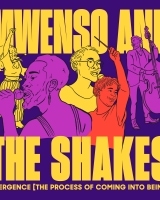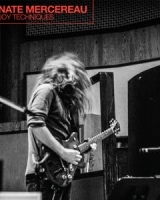Flippy features you in famous clips
There are other things we can do with your face. Like superimposing it on a celebrity’s body, for instance. And hear the new Adele song flit from your lips. If your lips are moving at the right time. If your timing is right.
Misha thought we’d reached the peak of the selfie. It turns out we’ve only reached the peak of our experience in our bodies as we know them. As they know us. Us and our bodies, a thing of the past.
“The most expressive part of your body is your face, right? And it’s what most people focus on anyway,” Misha says. I nod, but I’m thinking about something else. Maybe it’s not, I’m thinking. Or maybe it’s just me. “But there are other things we can do with your face,” he adds, and now I’m thinking about the options. Writing them out, making a list. “Other ways we can integrate your face into the environment.”
We’ve been speaking about the new app, Flippy. Misha is the CEO of Meograph. Meograph makes Flippy. We’re talking over the phone, which isn’t unusual. Flippy is unusual. Its rapid growth—the app launched in May; in July, it had 1 million monthly active users—is probably to be expected, even though Misha was surprised. It’s 2016. We are simultaneously consumers and producers of our own content. We’ve had that leverage for awhile. But even in the age of insta-celebrity, people still want their five minutes of old-school fame, red carpeted and silver-screened. And Flippy—which Misha and company coined by combining “clip” with “flip”—give users the casual chance for metempsychosis. Wish fulfillment meets Wi-Fi.
Flippy opened its doors to users in the spring; now it’s blossomed into a full-fledged social network, a place where parishioners of the cult of celebrity can meet one another—at least facially—link up, co-create.
“We’ve had some sort of advantage in terms of virility and social media because when you see the product, you immediately know what it is, even if the sound is off,” Misha explains. “‘Oh dude,’” he imitates, “‘there’s my friend on Taylor Swift’s body.’” He switches back to Misha. I’m still Chris. I think I’ve only ever been. “It doesn’t require an explanation,” he says. “And then of course, the next thing you say is, ‘Oh dude, I want to do that!’”
Our time is money, and we often spend each on things we shouldn’t. As Misha describes and as At Large confirms, the app is simple enough that with the half-second we have on our phone, we immediately know what Flippy is and how to use it. The fact that the emphasis is on the visuals—your face, Taylor’s body—is important, too, because most of us rack up those half-seconds at work, in public, surrounded by other people that have disconnected, lip-synched a line from Goodfellas, maybe consummated a body swap. Filed the company report.
Misha goes camping. If this is a segue or a scene-switch or just a dissolve—a flashback?—it’d read like this. On the page. On your screen. Misha goes camping. Not “Misha went camping” or “Misha had been camping” or even “Misha camped.” Misha goes camping. We’re situated. It’s only ever the present. The future of the past that is today as seen from tomorrow. And posted.
He’s with his girlfriend, and a few other folks. They’d been hiking; now they are drinking. Moonshine, not enough water. Everyone around a campfire, just like the movies but different, because this happened; this is happening right now.
Everyone goes to bed. Misha stays up. For some reason (he doesn’t know why), drinking moonshine, not enough water. It’s early fall, October of 2015. Somewhere along the Northern California Coast, Salt Creek or Salt Point, somewhere near San Francisco. Misha and his team at Meograph had already created three apps.
What are we good at? Misha asks himself. And what else can we do?
He is thinking about lip-synch apps. What do people like about those? To put your face in something. Whether it’s filters or whether it’s superimposing it somewhere—or on someone—else.
It’s an immediate moment where all of these things come together. Lip-synching, video, popular media, wish fulfillment.
The fire probably crackles. Everyone still asleep, except Misha, who grabs his pen and paper and sits up for the rest of the night, what’s left of it, drawing out Flippy, architecting Meograph’s fourth app, before it has a name. When there is only the idea of co-creation, simultaneous and instantaneous, with people you might never know. Who don’t know you.
Every other social media platform exists in its own vacuum, at least at the outset. The privacy of your bedroom, in public, interacting with other people in the same environment. More or less, or moribund. But with Flippy, you can be in the same video and create it together, without being in the same place or at the same time. A user picks off where their partner leaves off, or joins halfway through the production. When the scene calls for it, or during an impromptu re-write. The studio that got re-appropriated, too.
Flippy’s “flip squad” allows for this kind of spontaneity and provisional creativity, something closer to organic interaction on a platform that has done its best to prefabricate it.
Is the future of content-generation in escalating our displacement in order to ramp up our opportunities for contact?
“Some things are done very well in person,” Misha replies. “But when you look at most of the history of technology and consumer technology, it’s based around being able to do the things you want to do in the place and time of your choosing, less restrictions on how to do it.”
Meograph is a remote company too, split between two major cities: San Francisco—where Misha is speaking from now—and Atlanta.
“Really, we’re not in the tech business. We’re in the psych business. It’s enabled by technology,” Misha adds.
The product is just a byproduct, I think. Like any other transaction, iteration, moving moment. Maker, mark. If you can identify a base human desire and make it possible—when it works for you, where it works for you—you’re going to win every time. I’m not a business person. I’ve never been good with money, or counting it, but I know this much.
Meograph has achieved this, but the real win is dictated by what we do with the tool, the network, and our collaboration with it.
“If you give people tools to do something different,” Misha says, “they will find creative ways to use the tools in ways in which you would never have anticipated.”
Who knows? I think, as I align my face with Drake’s body, mimicking his lips mouthing “Call me on my cell phone.”
Maybe we’ll surprise each other.
Or at least ourselves.

